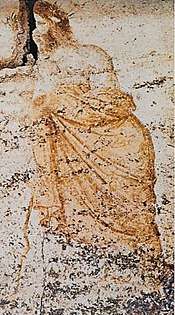Rhadamanthus
In Greek mythology, Rhadamanthus (/ˌrædəˈmænθəs/) or Rhadamanthys (Ancient Greek: Ῥαδάμανθυς) was a wise king of Crete. In later accounts he is said to be one of the judges of the dead.
| Greek underworld |
|---|
| Residents |
| Geography |
| Famous Tartarus inmates |
| Visitors |

Family
Rhadamanthus was the son of Zeus and Europa and brother to Sarpedon and Minos (also a king and later a judge of the dead).[1] Together with his brother, Rhadamanthus was raised by Asterion, their stepfather. He had two sons, Gortys (associated with Gortyn, Crete) and Erythrus (founder of Erythrae).
Other sources (e.g. Plutarch, Theseus 20) credit Rhadamanthys rather than Dionysus as the husband of Ariadne, and the father of Oenopion, Staphylus and Thoas. In this account, Ariadne was the daughter of Minos, Rhadamanthys' brother; another Ariadne was the daughter of Minos' grandson and namesake, who features in the Theseus legend, and was rescued by Dionysus.
Mythology
Legislation
Although he was frequently considered one of the judges of the dead in the underworld, he was known for few legislative activities. There is a reference to a law of Rhadamanthus ordering the Cretans to swear oaths by animals[2] and to another law of Rhadamanthus saying if a person defends themselves against another who initiated violence then they should suffer no penalty.[3]
Exile from Crete
Driven out of Crete by Minos, who was jealous of his popularity, he fled to Boeotia, where he wedded Alcmene, widow of Amphitryon and mother of Heracles. Also, according to some traditions, he was a tutor to Heracles.[4] This is also mentioned by Tzetzes, a medieval historian.
In general, the particular sphere of activity of Rhadamanthus tends to be the Aegean islands, apart from Crete itself, where Minos was active. He is also often connected by ancient authors with central Greece.[4]
Afterlife
According to later legends (c. 400 BC), on account of his inflexible integrity he was made one of the judges of the dead in the lower world, together with Aeacus and Minos. He was supposed to judge the souls of easterners, Aeacus those of westerners, while Minos had the casting vote (Plato, Gorgias 524A). He is portrayed in Books 4 and 7 of Homer's Odyssey. Virgil (69–18 BC) makes Rhadamanthus one of the judges and punishers of the unworthy in the Underworld (Tartarus) section of the Aeneid.
Homer represents him as dwelling in the Elysian Fields (Odyssey iv. 564), the paradise for the immortal sons of Zeus. Pindar says that he is the right-hand man of Cronus (now ruling Elysium) and was the sole judge of the dead. Lucian depicts Rhadamanthus as presiding over the company of heroes on the Isles of the Blest in True History.
Argive Genealogy
|
References
- Bulfinch, Thomas; Scott, J. Loughran (John Loughran) (24 January 1898). "The age of fable; or, Beauties of mythology". Philadelphia, D. McKay – via Internet Archive.
- Porphyry, De Abstinentia III.16.6, on which see Jean Bouffartigue, Porphyre, De l'abstinence, (Paris) 1979, p. 171 n. 2.
- Apollodorus Library of Greek Mythology, II.4
- John Davidson, Rhadamanthys and the Family of Herakles. L'antiquité classique, 1999, Vol 68, pp. 247-252
External links
![]()


